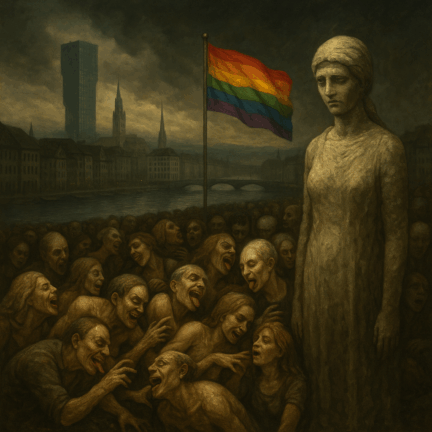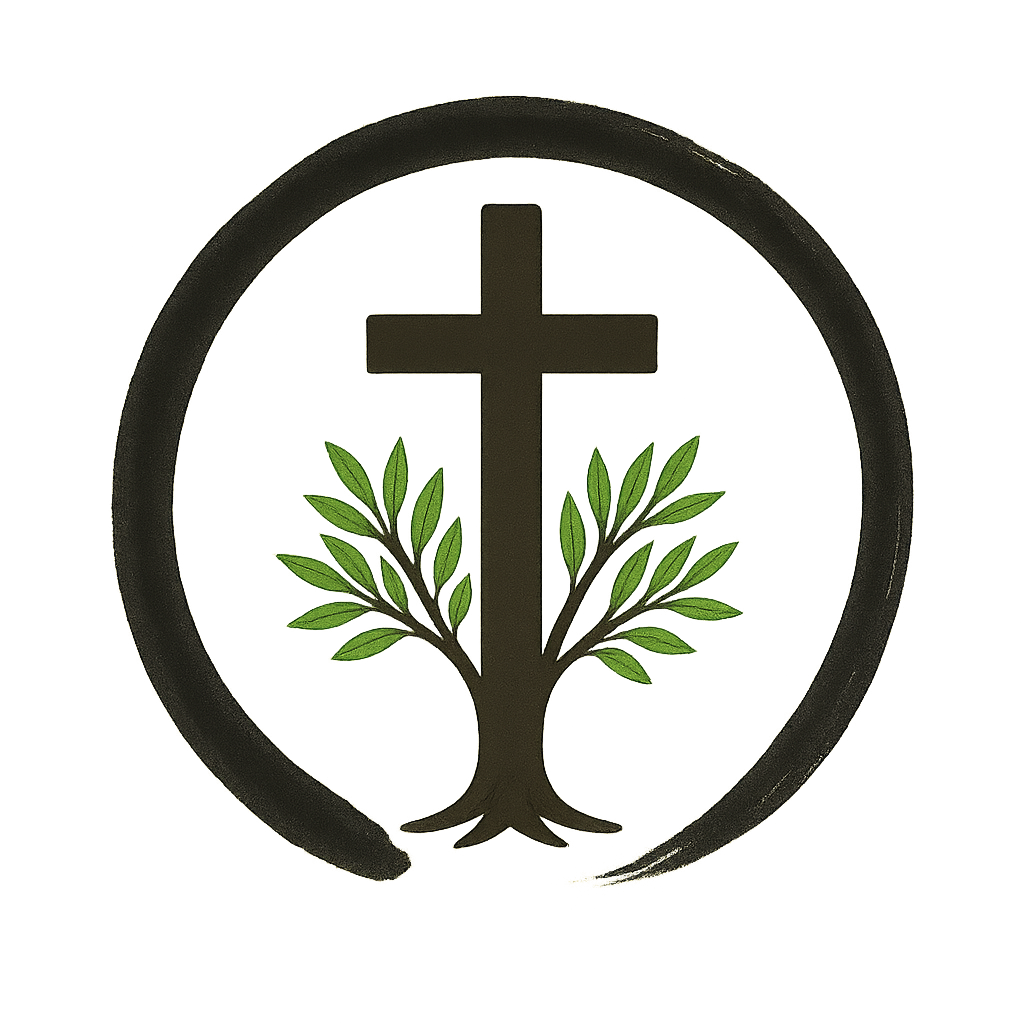Will the City of Zurich become Sodom and Gomorrah? – The Collapse of Order
Will the city of Zurich become Sodom and Gomorrah? The fall of Sodom and Gomorrah is not a past event, but a recurring pattern in the human soul. Whenever humanity erases the distinction between good and evil, when it exchanges measure and order for equality and arbitrariness, the old city returns.
History is thus not a chronicle of past peoples, but of the human soul: of its yearning for freedom—and its fear of responsibility.
Sodom represents the moment when the soul abandons its divine origin and makes itself the measure. What begins as liberation ends in confusion. That is why the cry from the depths is timeless:
Come forth, my people, so that you do not share in their sins.
The Cry from the Depths
Sodom and Gomorrah are more than cities. They are reflections of the soul when it loses its sense of proportion.
“The outcry over Sodom and Gomorrah is great,” it says in Genesis 18:20—a cry that reaches to heaven. Not the noise of the feasts, but the weeping of those hurt by the excesses of others. Sodom represents the point at which humanity no longer asks God what is good, but elevates itself to the measure. It calls freedom
what binds it, and progress what destroys it.
The Weakness of Man—The Loss of Order
Symbolically, Sodom speaks of the fall of the masculine principle: the failure of inner guidance, the extinction of measure. When the spirit loses its power, the heart also falls into disorientation. That which was originally meant to be alive turns inward, and what was creative becomes consuming. Sodom is the city where measure disappears, where no one protects anymore, where clarity becomes effeminate, and responsibility transforms into mere feeling. Then the feminine also loses its dignity—not because it is devalued, but because it remains without an counterpart.
The Sin of the City
The prophet Ezekiel describes Sodom's guilt:
It was proud, had an abundance of food and carefree prosperity, but it did not help the poor and needy. — Ezekiel 16:49–50
With this, he names the true core: pride, complacency, and indifference to suffering. The outward excess is merely a symptom. The real downfall is the loss of heart.
Sodom is the society that possesses everything and yet worships nothing. It mistakes lust for love, self-determination for freedom, and compassion for grace. That is why it falls—not because God destroys it, but because it dissolves itself.
The Angel and the Gate – Looking Back
Lot stands at the city gate—the place where justice is administered. He is the symbol of conscience, which can still discern amidst the chaos. Yet even he hesitates when the angels come to save him. It is so hard to leave a world one has grown accustomed to, even if it has long since decayed.
The angels urge:
Flee for your life! Do not look back and do not stand still! (Genesis 19:17)
The escape from Sodom is not a geographical journey, but an inner departure. It means letting go, even if the heart has grown accustomed to the chains. For every bond that does not come from truth blinds us to God's call.
Lot's wife, however, remains trapped in the old ways. She turns away—not out of defiance, but out of longing. She misses the people, the places, the city's splendor. But she mistakes love for habit, affection for dependence. Therefore, she becomes a pillar of salt an image of the soul that remains bound to the past and thus becomes immobile.
Salt is the element of preservation—but here it becomes a symbol of rigidity. What she wants to hold onto, she herself holds captive. Her gaze turns her to stone because it sanctifies the old, which is already condemned.
Lot's wife represents the person who should escape a toxic relationship but cannot. She knows her environment is destructive, yet clings to it because it is familiar.
She is the image of a soul that had to feed on what is false until it came to love it.
The way out of Sodom is always a path of separation: from places, from patterns, from people who bind us but do not nourish us. Salvation only happens forward—not backward. Those who glorify the old miss the new.
The salt of the past can heal if one recognizes it. But those who turn around in it become stagnant. Therefore, the escape from Sodom is not an escape from the world, but an escape from one's own self, which has lost God.
Sodom today—Humanity without measure
History repeats itself when the spiritual is emptied and the physical is idolized. Sodom exists wherever humanity believes it can create itself, redefine its nature, without source, without measure.
What once began as compassion becomes excess. What appeared as care becomes the erosion of boundaries. When a culture forgets the sacred within humanity, in order to... If emotions are no longer sanctified, then it stands—like Sodom—under the sign of fire.
The Forgotten—The Lost Heart
Ezekiel says:
They did not help the poor and needy. (Ezekiel 16:49)
In a spiritual sense, the “poor and needy” are those parts of the soul that depend on protection, affection, and truth—the childlike, the receptive, the feminine within. A culture loses its heart when it no longer honors these inner poor. Where the child is no longer nurtured but surgically altered, where the receptive loses its dignity and discards its children because devotion is considered weakness, there the soul begins to become impoverished.
Then that which is meant to receive and bear is declared common property—not in the sense of love, but in the sense of possession. The sacredness of relationship is transformed into interchangeability. But the blindness runs even deeper: Even the poor in spirit are no longer helped. The soul that seeks truth is comforted with half-truths. The sick (homosexuality, adultery, blended families) is glorified, the weak are glorified, the misguided are declared courageous.
Thus, Sodom confuses measure with opinion, knowledge with feeling, and calls error tolerance. In doing so, it kills the inner healer—the spirit of truth, which alone could heal. Sodom therefore also represents the loss of spiritual poverty, which is the prerequisite for all wisdom. For only the empty can receive.
Zurich—A City on Trial by the Soul
Zurich, too—a symbol of modern humanity—embodies both blessing and temptation. Prosperity and emptiness. Security and distance from God. Like Sodom once did, it stands in the tension between splendor and a loss of meaning. The more life becomes technologically advanced, the more responsibility is outsourced, the weaker the heart becomes.
Even the child becomes a projection screen, no longer a mystery. People want to shape it instead of receiving it. Thus, even love loses its sanctity.
Zurich is not yet Sodom—but it stands on the same threshold. Between memory and oblivion, between spirit and system. And the voice from the depths calls out here as well:
Come forth, my people, so that you do not share in their sins.
The City and the Collective—The Loss of Responsibility
In the city, the number of people grows—and at the same time, their souls shrink. The larger the mass, the smaller the individual responsibility. The light of conscience and morality dissipates in the glare of the lights. The city is the symbol of the collective, in which the individual can disappear. It offers security—but it also takes away the feeling of guilt. Responsibility is delegated to structures, to systems, to faceless voices. Thus, moral awareness diminishes because no one knows anymore who should act.
In the noise of the crowd, reason falls silent. The self dissolves into roles, into opinions, into affiliations. What was once a cry—"Where are you, human being?"—is drowned out by the language of the masses.
Therefore, the metropolis, as a symbol, is not only a place of progress but also a place of oblivion. One can hide there, invisible in the crowd, and believe oneself to be free, while one is already being led.
Zurich stands as a prime example: an orderly facade, a restless interior. Behind the gleam of freedom lies the silence of responsibility.
Equality Without Measure – Moral Relativism
When all differences disappear, so does measure. What once began as justice transforms into leveling. No longer does the value of the individual count, but their interchangeability.
Thus, the sacred is profaned, the unique is leveled, and the individual is sacrificed to the collective. In this internal ideology of equality, everything becomes equally valid – and what is equally valid soon becomes indifferent.
What is praised as freedom leads to the dissolution of boundaries. The individual loses their inner self because they are absorbed into the mass. It is the state of spiritual arbitrariness, in which no above and below, no true and false, no sacred and profane are recognized. The distinctions that establish divine order are erased.
Yet without difference there is no encounter. Without boundaries, no love. For love is always a relationship between two, not between many.
Thus, the striving for total equality becomes humanity's ultimate temptation: It wants to play God by dissolving all differences and fails to realize that in doing so, it loses itself.
The Fire of Purification
Sodom ends in fire—but the fire is purification, not revenge. It burns away what is false in order to save what is true. God does not destroy; he reveals. He takes from humanity what binds it in order to lead it back to itself. Sodom falls—but Lot is saved. This means: The soul can endure when it separates itself from the masses that have lost their sense of proportion.
The New Covenant
In the end, there is not destruction, but a new beginning. From the ashes of Sodom. There is a growing call for a new order, for a new masculinity and femininity that live not against each other, but for each other. For the divine order does not destroy, it heals. And where moderation returns, peace also returns.

